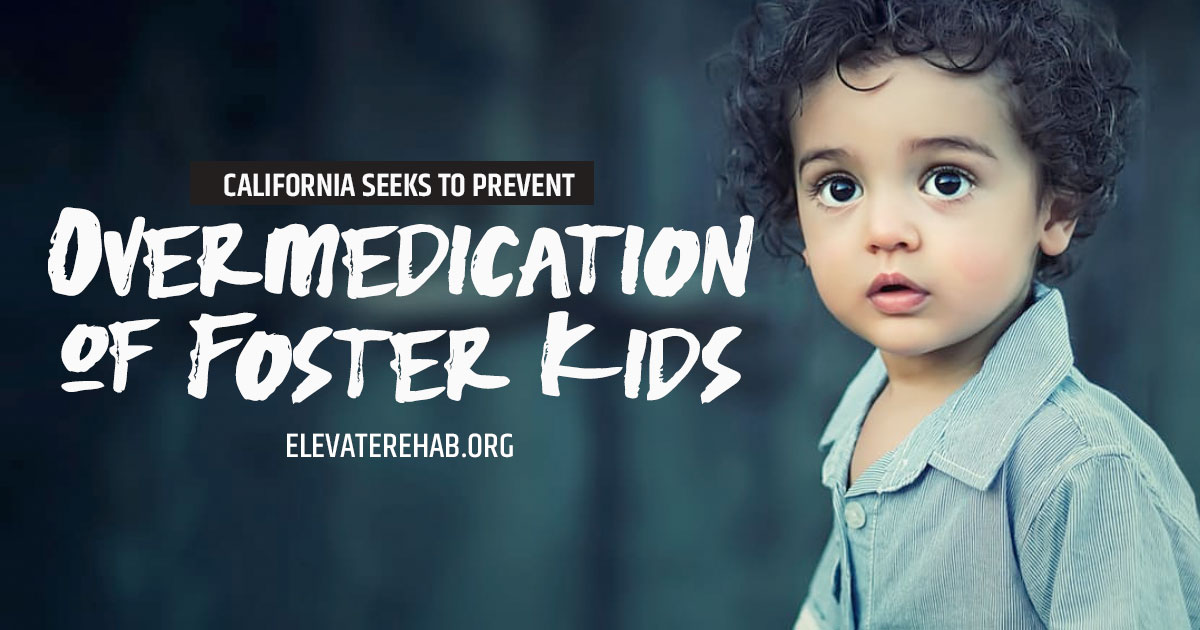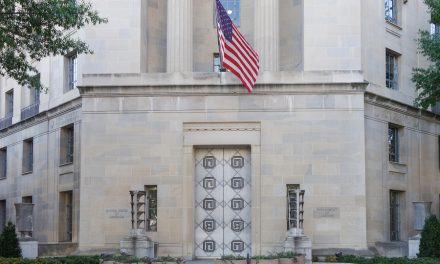(Note from Erin: Our friends at Elevate Addiction Services were so happy that we wrote a story about how children are being given antipsychotics, that they reached out to us and asked us to share this story with you all. This must stop. Read. on.)
In the past, lawmakers didn’t think twice about how doctors treated foster children suffering from emotional traumas such as abandonment and abuse. Nobody controlled how often practitioners prescribed psychiatric drugs that had serious potential for doing more harm than good. Today, investigations into California’s foster care system shed light on the doctors who fuel medication problems by inappropriately prescribing narcotics to the state’s most vulnerable children – ultimately leading to three new California laws.
RELATED ARTICLES:
- Govt Exposed For Forcing Foster Kids, Even Toddlers To Take Dangerous Psychotropic Drugs
- 1 in 6 Americans Are Now on Psychiatric Medication
A Glance at California’s Foster System
When the Juvenile Division has reason to remove a child from home due to abuse or neglect, it will place the child according to his or her needs and best interests. A child removed from his or her legal guardian may live with another parent, if parents are separated or divorced. This is usually the best-case scenario, as the child can continue to live with a family member. If another parent is not available or appropriate under the circumstances, the Juvenile Division will place the child instead with other relatives.
 As a last resort, the child will go to a group home or enter the foster care system. By order of the courts, child protection agencies and parents will work together to reunite the child with his or her family as quickly as possible. Once a child leaves home, the court will hold hearings at intervals of at least every six months. During the hearings, the court will assess the situation, ensure the right parties are making efforts to bring the child back home and make decisions based on the child’s best interests.
As a last resort, the child will go to a group home or enter the foster care system. By order of the courts, child protection agencies and parents will work together to reunite the child with his or her family as quickly as possible. Once a child leaves home, the court will hold hearings at intervals of at least every six months. During the hearings, the court will assess the situation, ensure the right parties are making efforts to bring the child back home and make decisions based on the child’s best interests.
During their time in foster care, children typically have contact with their parents. The foster system encourages parents to visit regularly to maintain the parent/child relationship as much as possible. Parental visits serve to make the child’s life easier and expedite the reunion process through consistent communication. The goal of California’s foster system is to provide children with a safe haven to live until they can reunite with their families.
Foster Children and Psychiatric Drugs
California has the largest foster care population in the country. In the last 20 years, the number of kids in California foster care has tripled. The main reason the Juvenile Division of California puts children in a foster family is physical abuse at home (18.8%). Other causes are emotional abuse (7.9%), sexual abuse (6.2%), and caretaker inability (3.2%). Regardless of the reason for being in the foster care system, most children have experienced instability and mental turmoil because of their situations.
Foster kids may feel insecure and scared about their futures, upset and confused about what has happened to them, or blame themselves for their situations. The emotional trauma of separation from one’s family due to abuse or neglect takes its toll on most children, who then turn to foster care doctors and therapists for help. Sadly, the prescribing of medications to foster children has gone largely unregulated and unexamined for decades.
Psychiatric drugs are often not the best course of treatment for children. Instead of prescribing medications with limited approval for pediatric use to numb feelings of fear, sadness, and frustration, doctors should instead guide foster children should gravitate toward non-medicinal therapies and other, safer, alternatives. Unfortunately, a fraction of foster care doctors inappropriately prescribes narcotics to these vulnerable kids, worsening the situation with debilitating side effects instead of providing adequate professional help.
Digital First Media Foster System Investigation
 Digital First Media, the Southern California News Group management company, launched an investigation into California’s foster care doctors in 2014. In the “Drugging Our Kids” investigation, the company delved into the prescribing habits of doctors using Medi-Cal pharmacy public records data and revealed a shocking truth – one in four children in California’s foster care system received psychotropic drugs to control their behavior rather than to treat the serious mental illnesses intended for the drugs.
Digital First Media, the Southern California News Group management company, launched an investigation into California’s foster care doctors in 2014. In the “Drugging Our Kids” investigation, the company delved into the prescribing habits of doctors using Medi-Cal pharmacy public records data and revealed a shocking truth – one in four children in California’s foster care system received psychotropic drugs to control their behavior rather than to treat the serious mental illnesses intended for the drugs.
In addition to this, Digital First Media found that 10% of California’s highest prescribing doctors were responsible for a whopping 50% of children receiving antipsychotic drugs. Antipsychotics are one of the most dangerous prescription drugs on the market, with incredibly harmful side effects. Antipsychotic and psychotropic substances treat serious mental illnesses and should never be prescribed loosely.
Nine different countries, including the U.S., have issued 94 warnings regarding the harsh side effects of antipsychotic drugs. These side effects include drowsiness, dizziness, weight gain, nausea, heart problems, strokes, convulsions, seizures, and death. On top of the dangers from these side effects, foster children have also been at risk of risky, unproven combinations of prescription drugs from doctors – a type of malpractice that could be deadly.
California State Auditor Investigation
 In August 2016, the California State Auditor investigated foster care case files from Madera, Riverside, Los Angeles, and Sonoma. They found that some doctors were prescribing children psychotropic medicines in excessive amounts that exceeded state guidelines. During the audit, the California Department of Social Services – the organization in charge of monitoring counties’ compliance with prescription rules – was unable to identify which foster children were prescribed medications. The Department of Health Care Services also failed to come up with this information.
In August 2016, the California State Auditor investigated foster care case files from Madera, Riverside, Los Angeles, and Sonoma. They found that some doctors were prescribing children psychotropic medicines in excessive amounts that exceeded state guidelines. During the audit, the California Department of Social Services – the organization in charge of monitoring counties’ compliance with prescription rules – was unable to identify which foster children were prescribed medications. The Department of Health Care Services also failed to come up with this information.
The California State Auditor’s report also found that some counties didn’t always acquire court or parental approval to prescribe psychotropic drugs – a legal requirement. Margarita Fernandez, the Auditor’s chief of public affairs, described the oversights as “fragmented,” and “specifically for psychotropic medications.” The report noted a lack of collaboration that risks the health and safety of foster kids.
Tracking the Psychiatric Drug Problem in California
From 2014 to 2015, foster care doctors prescribed psychotropic drugs in the equivalent of 10 prescriptions per child per year – 96,000 prescriptions total. One psychiatrist in San Bernardino County, Dr. Warris Walayat, prescribed 328 foster children anti-psychotic drugs. Digital First Media investigated 85% of these patients and found that when the first drug didn’t work or wasn’t enough, Dr. Walayat would routinely prescribe another anti-psychotic on top of the first.
Harmful and inappropriate prescribing of antipsychotics to foster kids can lead to drug misuse and addiction and may have contributed to the overwhelming drug problem in the state today. The astonishing rate at which foster care doctors prescribe strong mental health drugs to children has been under examination before during the 2010 U.S. Senator’s nationwide investigation.
The government took no action against the doctors identified in the study. The doctors weren’t subjected to any disciplinary actions and were free to continue with their harmful habits. Today, a fraction of foster care doctors still heavily medicate youth. Hopefully, new California laws will make a much-needed change.
New CA Laws Strive to Reel Back Over-medication
 Rochelle Trochtenberg, a former L.A. County foster child and current California foster care ombudsman, has spent four years working with other youth advocates and state agencies to reduce over-medication. Trochtenberg herself suffered due to too many medications throughout her youth. Her work has helped state lawmakers pass three new bills in California and is a statement to foster children around the nation that people are finally starting to pay attention.
Rochelle Trochtenberg, a former L.A. County foster child and current California foster care ombudsman, has spent four years working with other youth advocates and state agencies to reduce over-medication. Trochtenberg herself suffered due to too many medications throughout her youth. Her work has helped state lawmakers pass three new bills in California and is a statement to foster children around the nation that people are finally starting to pay attention.
Lawmakers in Sacramento have gone above and beyond other state legislatures to protect foster kids from suffering from questionable psychiatric care and inappropriate prescriptions that fail to treat their trauma’s underlying causes. This year, three laws took effect in California to take prompt, aggressive action to stop over-prescribing and put an end to harmful side effects in children such as sedation, diabetes, obesity, and irreversible tremors. There are three more related bills on the governor’s desk in addition to the new laws.
Taking a Look at the Three New Bills
Democratic state Senators Bill Monning, Jim Beall, and Mike McGuire authored the three new California bills. In essence, these laws give the Medical Board of California more control to investigate doctors who over-prescribe to foster children, ensure counties have enough non-pharmaceutical therapies to meet foster kid’s needs and require juvenile courts to review physicians who prescribe certain drug combinations or give prescriptions to children ages five years and younger.
Senate Bill 1174, designed by Sen. Mike McGuire, requires annual monitoring of doctors with a history of over-prescribing. It allows the California Medical Board to take action against such physicians, even taking away their medical licenses. Senate Bill 1291 by Sen. Jim Beall pushes for better tracking of mental health services for Californian foster kids, as well as more transparency in the system. Senate Bill 253, by Sen. Bill Monning, requires doctors to submit further justification for prescriptions considered risky before the state will approve them.
Opposition to these bills state that the new laws will overburden doctors and reduce a number of psychiatric drugs properly prescribed. The three bills are still brand new in California, and the state won’t see any significant changes in the foster care system right away. However, the passing of this package of bills and the future bills still pending act as a spark of hope to children in the foster care system in California and beyond.
*Article originally appeared at Elevate Addiction Services.












